This homemade vegan turkey roast is the perfect centerpiece for your plant-based Thanksgiving dinner. Complete with herb-rubbed "skin," tofu seitan turkey (or tofurky) is moist, tender, and filled with savory herbs and seasonings! Leftovers taste amazing, and it's perfect for making in advance. Bake it in the oven or cook it in the Instant Pot!
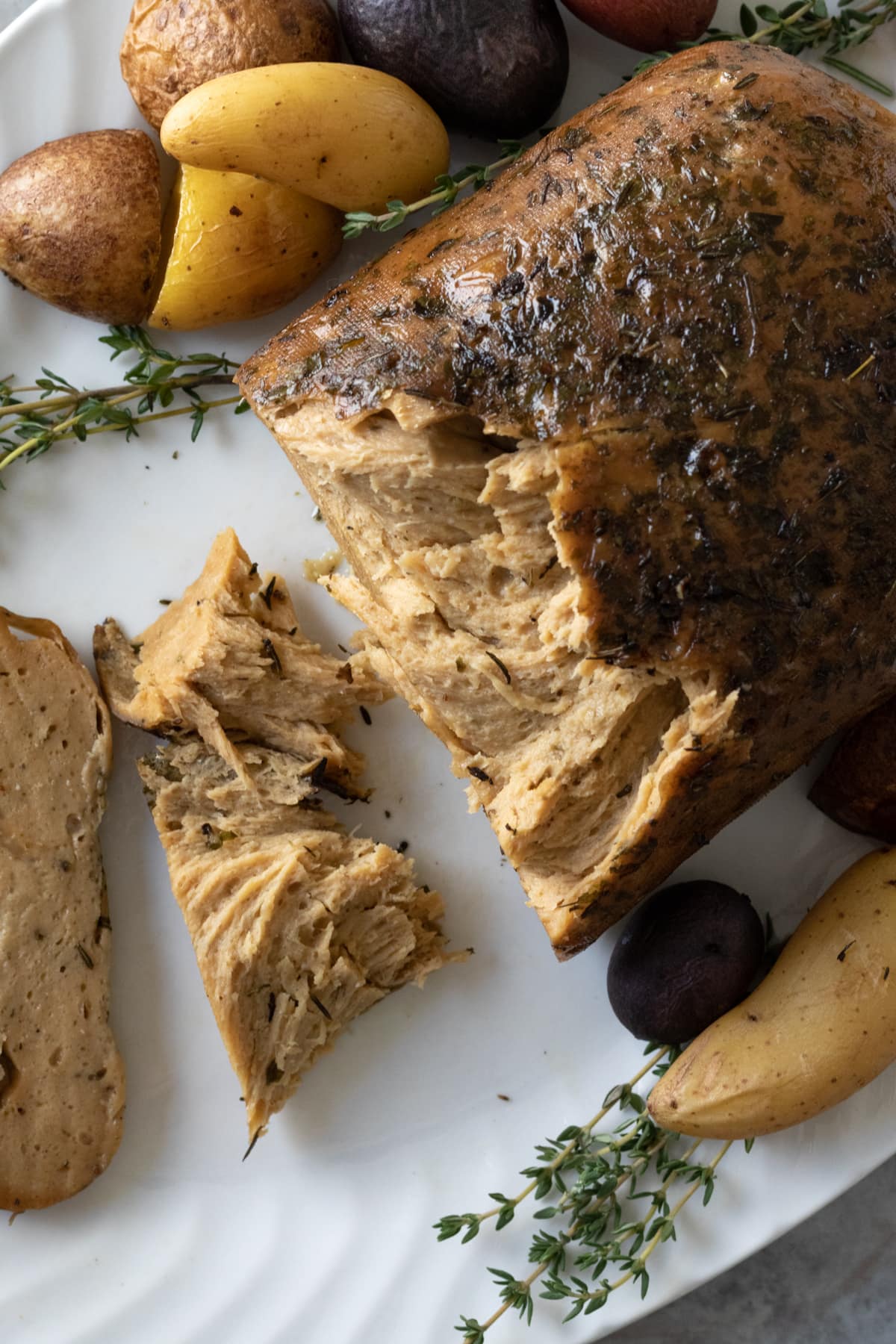
📩 Email me the recipe!
We respect your privacy. Opt out anytime.
I recently shared this Seitan Roast recipe, with a focus on simple prep and ingredients. Today's vegan turkey recipe is perfect for Thanksgiving and introduces a few new fun techniques.
Both of these recipes are 100% perfect for the holiday season, and really, this homemade Tofurky copycat isn't that difficult either! It just has a few more steps.
Jump to:
Recipe Features
- Color - This seitan turkey incorporates tofu for a lighter color.
- Texture - Similar to my other seitan roast, this one slices beautifully, but it also shreds! Check out the "twist and fold" technique. I learned it from Malin of the blog Seitan Kitchen (unfortunately, her website no longer exists). This method is very easy to do and can be incorporated into pretty much any seitan recipe where you want the gluten going in different directions, similar to actual muscle fibers (except ours is fun, not cruel).
- "Skin" - For our vegan turkey I'll show you how to use a portion of the seitan dough to create a smooth outer "skin" for your roast. I find it easier than dealing with rice paper.
- Kneading Method - Since you'll have your food processor out for blending the ingredients, we'll let it handle the kneading, too.
- Cooking Method - You can bake the roast in the oven OR cook it in an Instant Pot.
- Size - This plant-based turkey isn't as large as my other roast, but it's perfect for serving 4 or 5 people. You can scale the recipe up if needed!
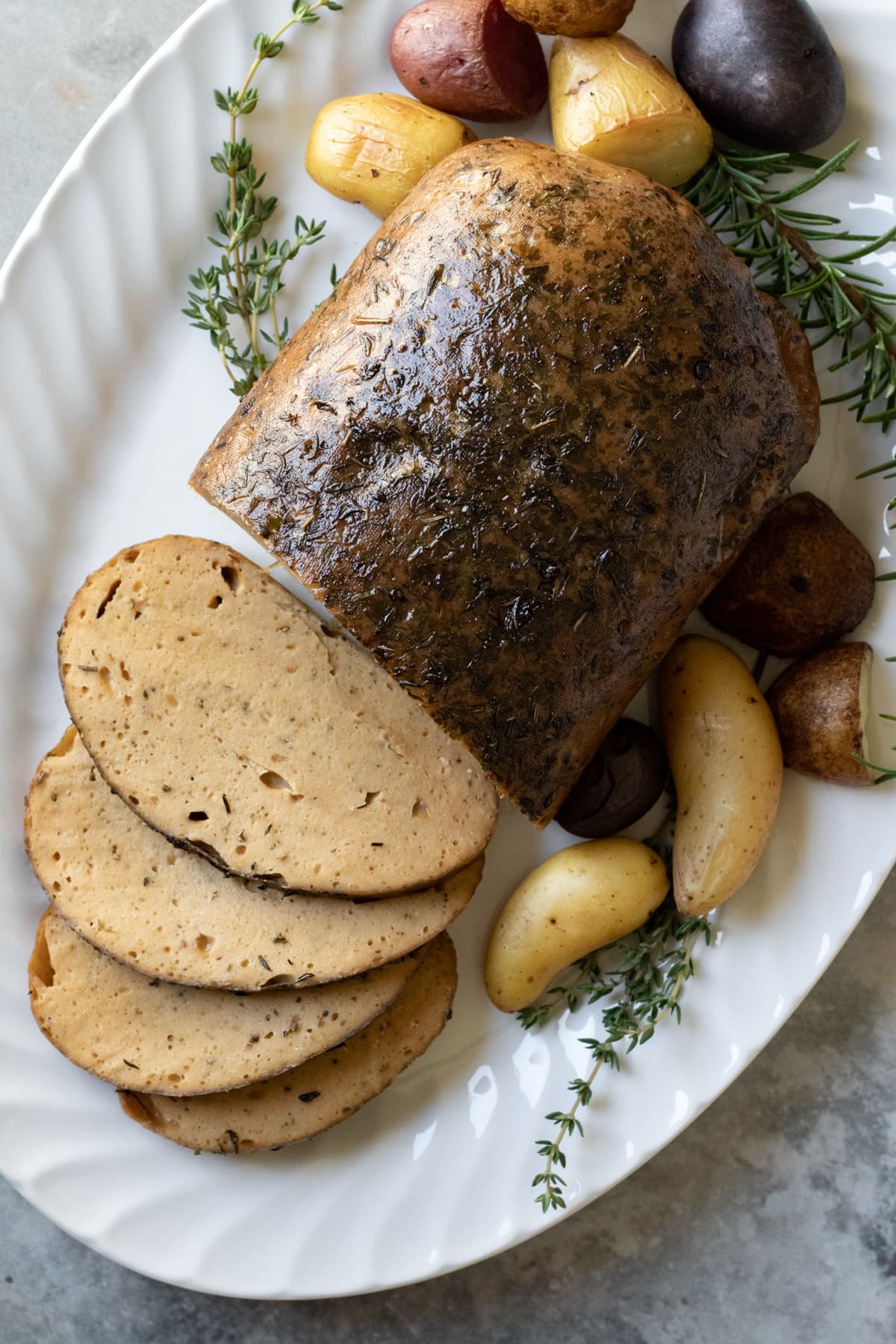
A variety of different herbs, spices, and seasonings bring the best savory holiday flavors to this vegan turkey. But don't let the length of the ingredient list scare you away! Here are the basics...
Ingredients
- Tofu - Look for super firm tofu, usually found in shrink-wrapped packaging. Tofu works well for vegan turkey because it lightens the color of the seitan and also makes it more tender.
- Vital wheat gluten - This is the base for seitan and what gives vegan turkey a firm and meaty texture. This can't be substituted.
Need a gluten-free vegan Thanksgiving main? Try this apple cider tofu! - Vinegar - Adds to the overall complexity of flavors; use either distilled white vinegar or apple cider vinegar.
- Nutritional yeast - Adds umami and tenderizes the seitan.
- Tapioca starch or flour - This is also for texture and to lighten the color.
- Vegan chicken seasoning - There are several brands of vegan-friendly, poultry-flavored broth powders and bouillons available these days. See detailed notes below.
- Oil - For the seitan, you'll need a neutral-tasting oil such as olive or avocado. For the outside of the roast, to help the herb rub stick to the skin, refined coconut oil works best.
- Liquid smoke - I use Colgin's hickory variety. You can omit this ingredient if you don't care for it.
- Herbs and spices - You'll need dried rosemary, thyme, sage, and ginger.
And for the herb rub and glaze you'll need:
- Dried parsley, thyme, salt and pepper
- Soy sauce - or similar
- Toasted sesame oil or olive oil
See the recipe card below for amounts and full instructions.
How to Make a Vegan Turkey Roast
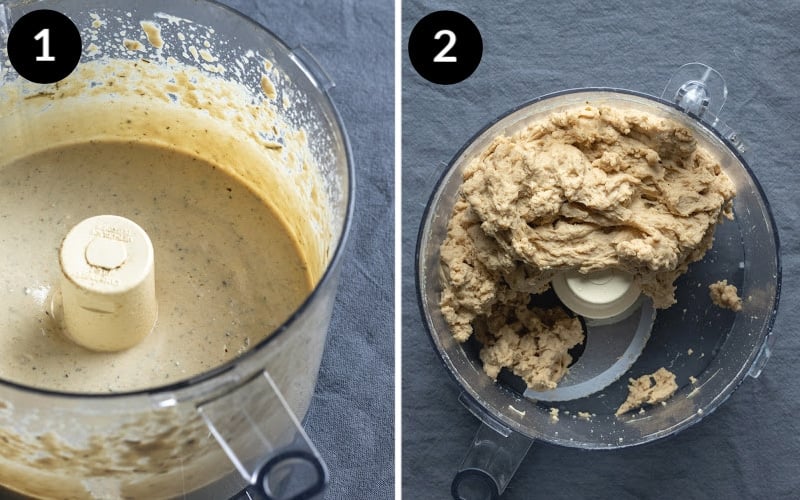
- Puree the tofu, water, and seasonings in a large food processor I use a 14 cup model; if using a smaller machine try working in batches.
- Add vital wheat gluten, and process for 1 minute. You'll see the gluten strands forming, but the dough will still be fairly soft and sticky.
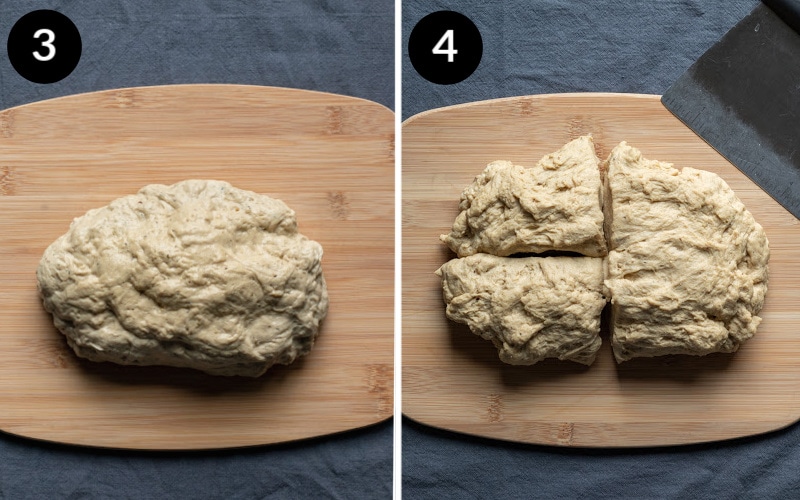
- Place dough on a flat surface.
- Cut in half, then in half again. One quarter of the dough will serve as the turkey skin. Set that quarter aside.
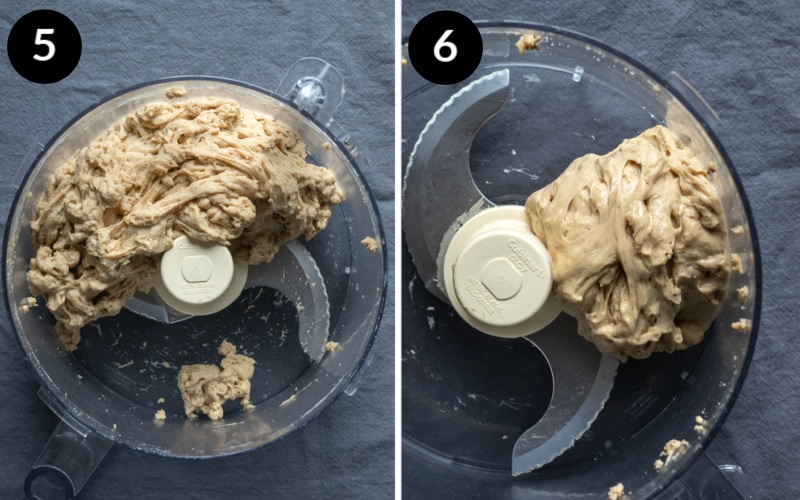
- Return three-quarters of the dough to the food processor, and process for 1 minute. Remove and set aside.
- Place the "skin" in the food processor. Add 1 more tablespoon of vital wheat gluten, and process for 1 minute. It should be warm and shiny. Set aside.
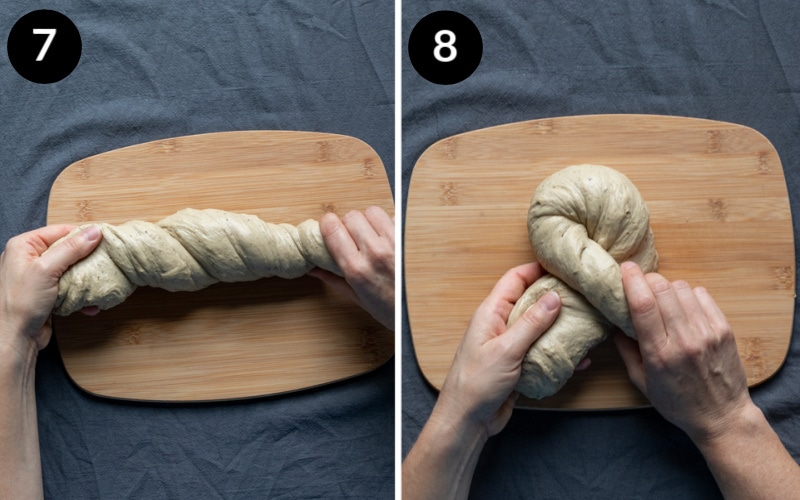
- Take the larger piece of dough, and shape it into a log. This will become the body of the roast. Twist it as pictured below left.
- Fold one end of the dough over the other like you're going to tie a knot. Now it looks like a ribbon.
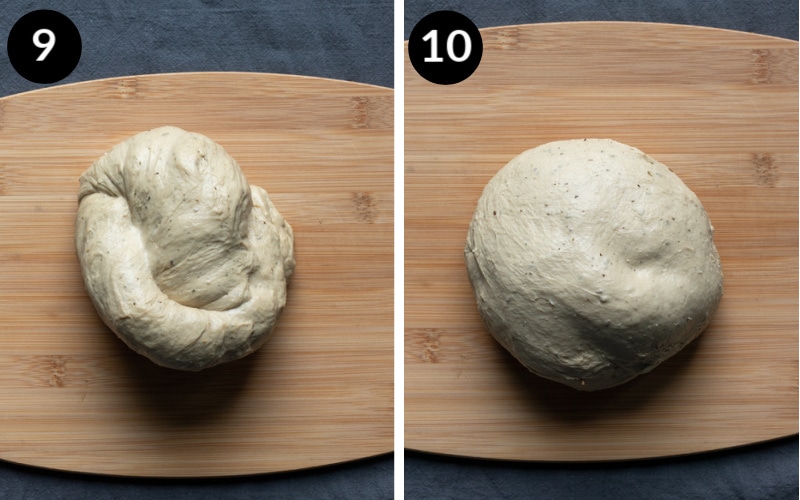
- Tuck the right tail underneath, then tuck the left tail underneath. Now repeat steps 7 - 9, doing the "twist and tuck" again (the dough will be more firm than when you began).
- Holding the dough with both hands, smooth the surface by gradually working the outer edges underneath. Once the top appears fairly smooth, set aside.
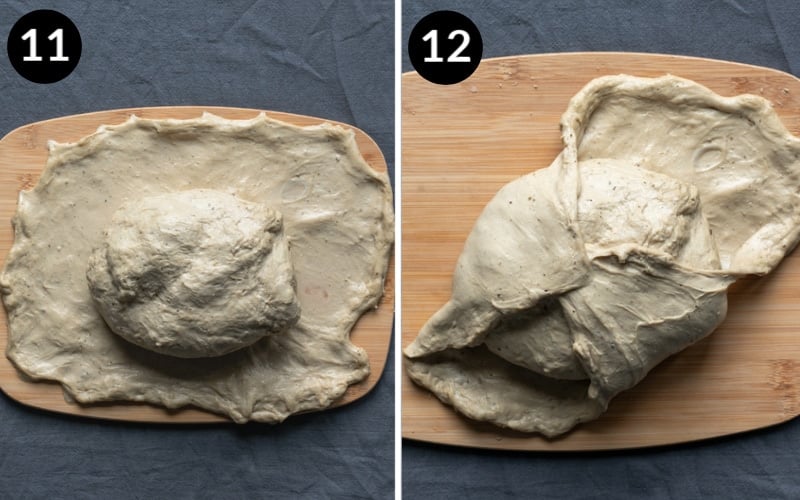
- Take the "skin" piece of dough, and, like you're handling pizza dough, carefully stretch it into a rectangle as shown below. Lay the skin out flat. (Alternatively, you can drape it over the top of the roast, then flip the whole thing over.)
- Place the roast top-down on the skin. Begin folding in the edges of the skin, pinching it together, until the entire roast is fully wrapped.
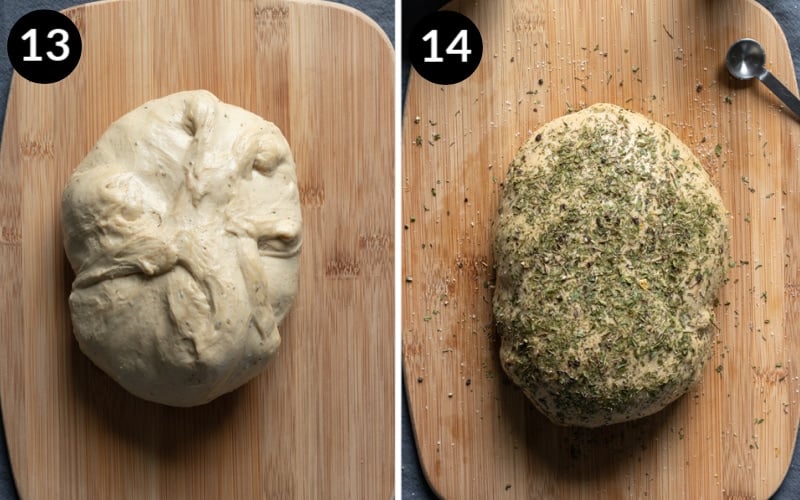
- This is how the underside looks. The top is smooth and looks surprisingly similar to raw turkey or chicken. Pinch together any holes or open seams.
- Rub the entire roast with a small amount of oil. If using the herb rub, sprinkle it onto the roast, both top and bottom. Do the same with salt and pepper. Use your hands to lightly pat the seasonings into the skin.
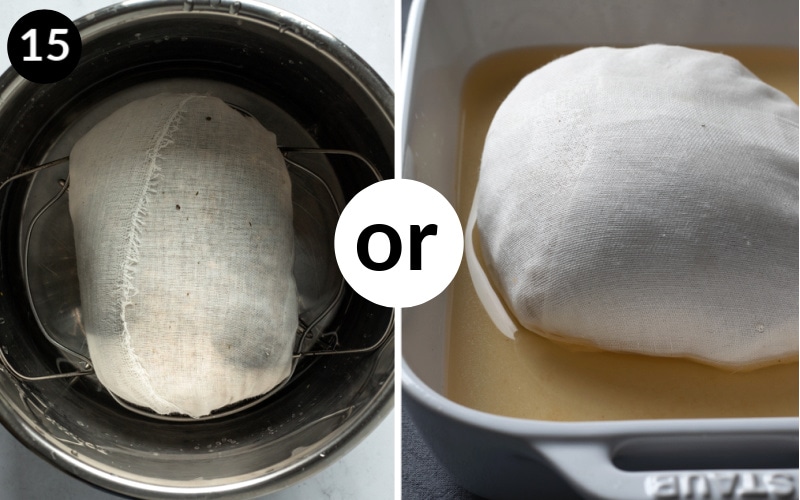
- Wrap the seitan turkey tightly in cheesecloth (for Instant Pot or oven) OR a layer of parchment followed by a tight layer of heavy duty aluminum foil. Now it's time to cook!
Choose a Cooking Method
Instant Pot
- Add just enough water to the Instant Pot to reach the bottom of the trivet. Place the cheesecloth-wrapped seitan turkey on the trivet, and cook on high pressure for 1 hour 15 minutes. Allow the pressure to naturally release.
Oven, Wrapped in Cheesecloth
- Preheat oven to 350 degrees F. Add about 1 inch of vegetable broth to a baking dish or roasting pan.
- Place the cloth-wrapped roast in the pan, and cover the dish tightly with foil so the steam is trapped inside. Bake for 1 hour, then carefully remove the foil and flip the roast. Replace the foil, and bake for another 45 minutes. Add more broth to the dish as needed to prevent scorching.
- Press the center of the roast with tongs. Your vegan turkey should feel very firm when done. If you think the center might not be done, return to the oven for another 10 to 15 minutes.
Oven, Wrapped in Foil
- Preheat oven to 350 degrees. If using foil instead of cheesecloth there's no need to place the roast in broth. Simply wrap very tightly in foil and place on a baking sheet. Heavy duty aluminum foil is best.
- Bake for 1 hour, then flip and bake for another 45 minutes.
- Press the center of the roast with tongs. When done it should feel very firm.
- Let stand for a few minutes before carefully unwrapping. Let the roast cool completely before storing. See tips below.
Can I make it in advance?
Absolutely! In fact, the texture and firmness of seitan turkey is even better the next day. Let your vegan turkey cool completely, then store in an airtight container in the refrigerator overnight.
If you aren't able to make the roast a day in advance, try to cook it early in the day. Then let it rest for a few hours.
How to Reheat
If you made the vegan turkey roast the day before, remove it from the refrigerator 1 to 2 hours before dinner so it can warm up.
Then place in a baking dish and baste with broth. Cover tightly with foil and bake at 375 for about 20 minutes or until hot. Once the roast is hot, complete the glaze/broil step before serving.
To reheat leftovers, individual servings may be warmed up in the microwave.
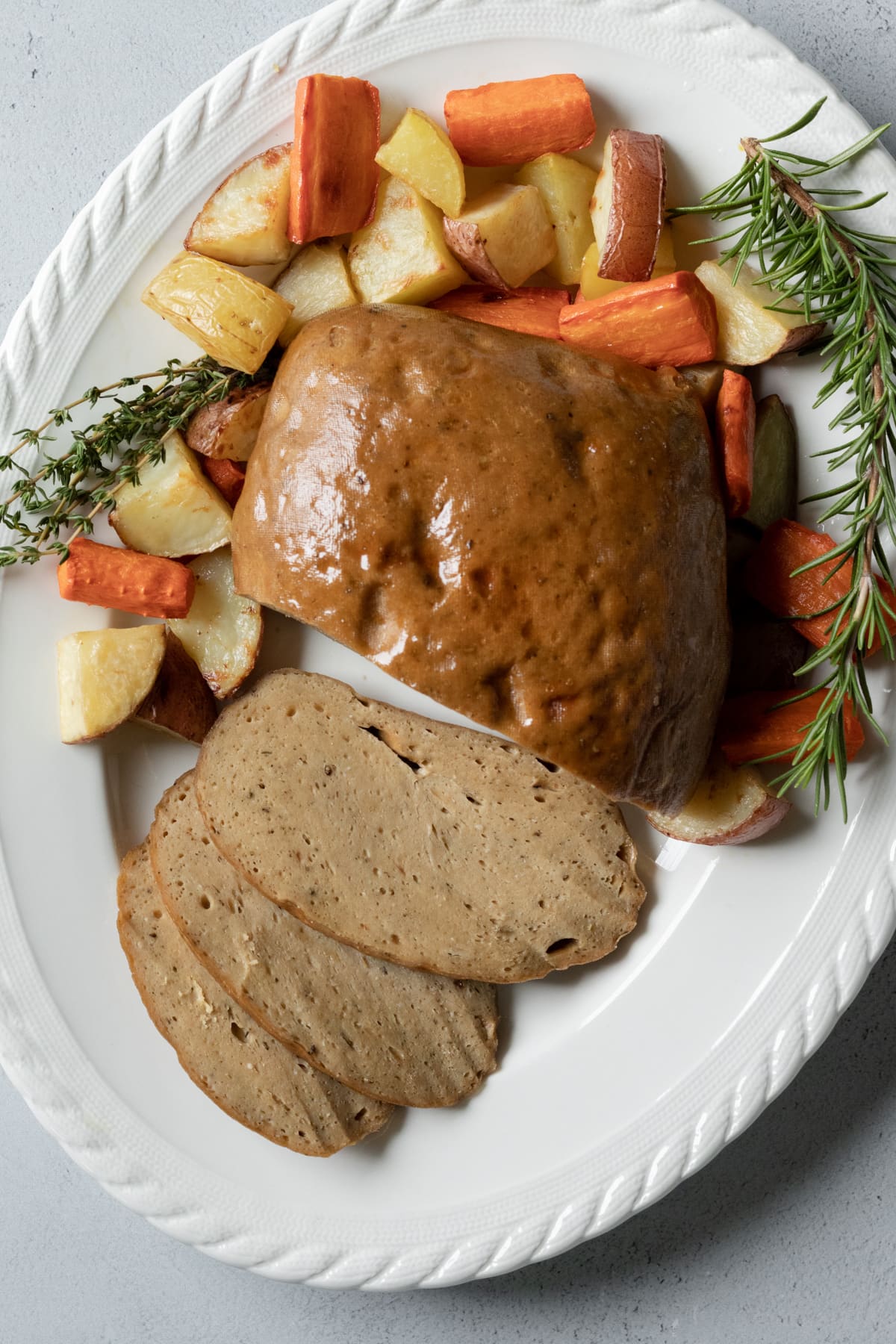
Substitutions
Tofu
The recipe calls for super firm tofu, which doesn't need to be pressed and is different than extra firm tofu. I use the high-protein tofu from Trader Joe's. If you don't have access to that product, look for a tofu that is vacuum-packed, dense, and contains very little water. Do not use soft or silken tofu.
If you need to substitute extra firm tofu, press it first. An easy way to do this is to place the entire block of tofu on a tea towel. Gather up the ends, then squeeze out as much water as possible.
With super firm tofu you'll use about ⅔ of a 16 ounce package. With pressed, extra firm tofu, use approximately ¾ of a standard 14 ounce package.
Chicken Flavor Seasoning
Orrington Farms Chicken Flavored Seasoning can be purchased online (Amazon affiliate link). Or feel free to use one of the options listed below.
Edward & Son's Not-Chicken is available online and usually carried by Whole Foods and well-stocked grocery stores. To substitute, use approximately 2 bouillon cubes in place of the 3 tablespoons or Orrington powder.
Better Than Bouillon No-Chicken Base is also great for this recipe. Use 1 ½ tablespoons bouillon paste to replace 3 tablespoons of Orrington Farms powder.
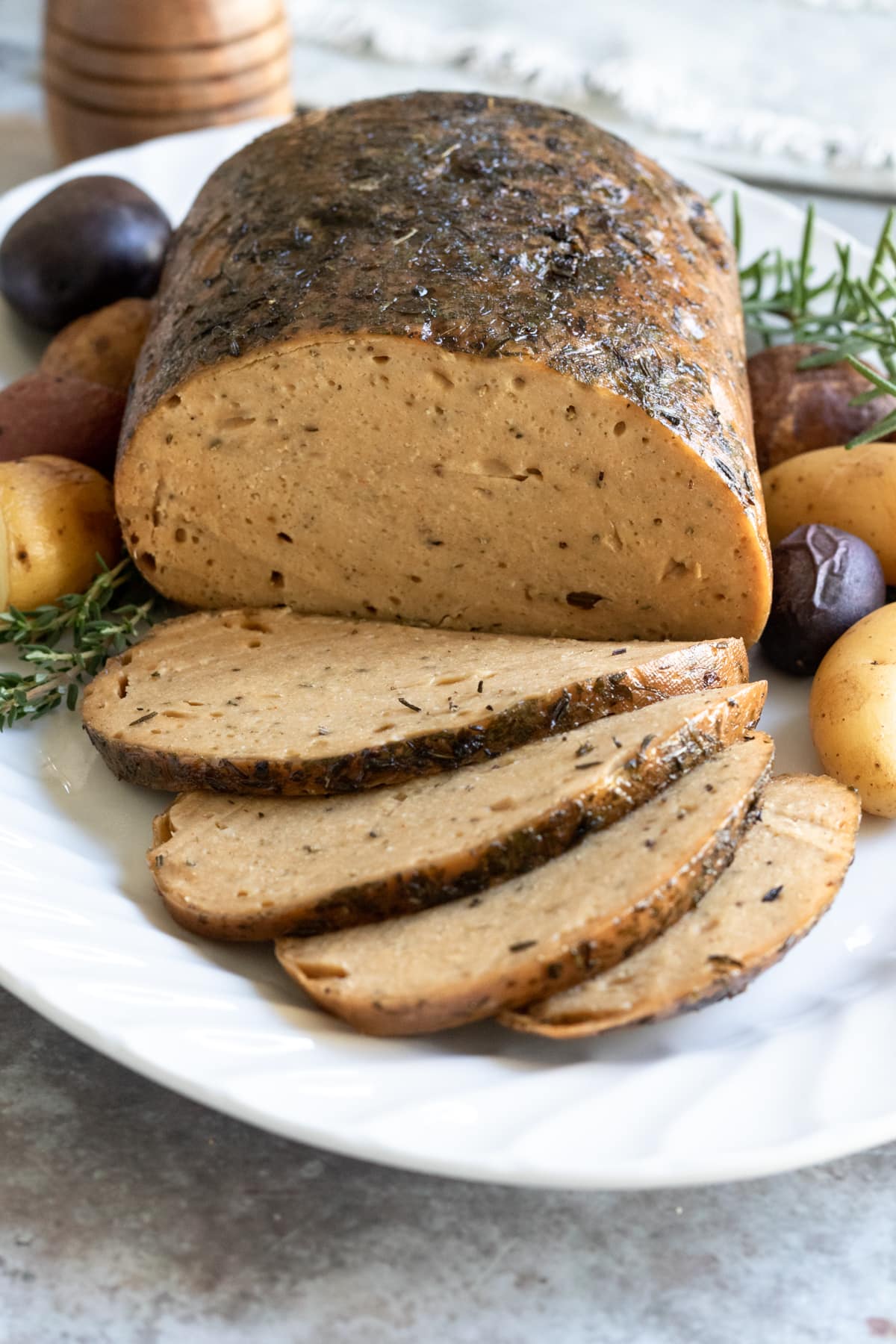
What to Serve With Vegan Turkey
If you're preparing a vegan turkey for Thanksgiving, here are some of our favorite vegan Thanksgiving recipes to round out your meal!
Outside of the holiday season, vegan turkey is great for weekly meal prep and slicing for sandwiches. You can also shred it for your favorite vegan barbecue dishes, pile it on baked potatoes, tacos, nachos, and more.
I hope you enjoy this special vegan turkey roast! If you try the recipe I would love to hear from you. Comment below to let us know!
Recipe Video
Feeling intimidated? Watch the video to see the vegan turkey come together. You've got this!
Recipe
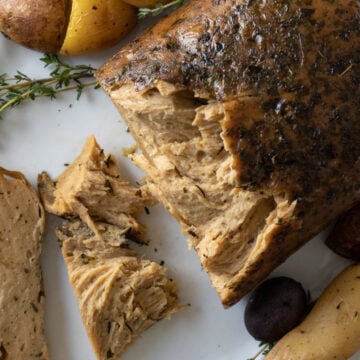
Vegan Turkey Roast
Equipment
- cheesecloth - optional
- 6-quart instant pot - optional
- rectangular baking dish - optional
Ingredients
For the Roast:
- 10 ounces super firm tofu - Such as Trader Joe's vacuum-packed variety. Ten ounces is approx. ⅔ of the package. See Notes.
- 4 large cloves garlic, peeled
- ¼ cup tapioca starch
- ¼ cup nutritional yeast
- 3 tablespoons Orrington Farms Vegan Chicken Flavored Powder, dry - Or similar product; see Notes
- 2 tablespoons white vinegar or apple cider vinegar
- 2 teaspoons onion powder
- 1 teaspoon dried rosemary (not powdered)
- 1 teaspoon dried thyme (not powdered)
- scant ½ teaspoon ground sage
- ½ teaspoon ground ginger
- 1 teaspoon fine sea salt
- 2 tablespoons olive oil
- 1 teaspoon toasted sesame oil, optional
- 1 ½ teaspoons liquid smoke, optional
- ¾ cup water
- 190 grams vital wheat gluten (1 ½ cups) plus 1 Tbsp, divided - if not using a kitchen scale, whisk the flour first to fluff it up then measure with cups.
- ½ teaspoon refined coconut oil or other neutral flavored oil
Herb Rub (optional):
- 1 teaspoon dried parsley
- scant ½ teaspoon dried thyme
- ¼ teaspoon fine sea salt
- black pepper
Glaze (just before serving):
- 2 teaspoons maple syrup
- 2 teaspoons soy sauce
- ½ teaspoon toasted sesame oil or olive oil
Broth (only needed if baking wrapped in cheese cloth):
- approx. 2 cups vegetable broth or water + bouillon
Instructions
- Crumble the tofu into a large food processor with the standard S-blade (see Notes re: food processor). Add all remaining roast ingredients EXCEPT vital wheat gluten and coconut oil. Process the tofu and seasonings into a smooth slurry. Add 1 ½ cups vital wheat gluten (190 g), and process for 1 minute.
- Remove dough from food processor, and place on a work surface. Shape into a rectangle. Cut into 4 somewhat equal-size pieces. Select the smallest one; this will be the "skin."Set that piece aside. Return the other 3 to the food processor, and process for 1 minute. Transfer to the work surface and knead by hand a few times to make sure it feels firm. Set aside to rest.
- Place the "skin" piece of dough back in the food processor. Add 1 tablespoon vital wheat gluten, and process for 1 minute. It should look shiny and smooth. Set aside.
 Shape the larger piece of dough into a log. Twist it until it begins to break or resist (see photos). Fold the twisted log so that it resembles a ribbon. Tuck the right tail underneath, then tuck the left tail.
Shape the larger piece of dough into a log. Twist it until it begins to break or resist (see photos). Fold the twisted log so that it resembles a ribbon. Tuck the right tail underneath, then tuck the left tail. Now you have a rough ball shape. Repeat the process of stretching out into a log, twisting, folding, and tucking. Holding the dough with both hands, smooth the surface by gradually working the outer edges underneath. Once the top appears fairly smooth, set aside.
Now you have a rough ball shape. Repeat the process of stretching out into a log, twisting, folding, and tucking. Holding the dough with both hands, smooth the surface by gradually working the outer edges underneath. Once the top appears fairly smooth, set aside. Take the "skin" piece of dough and, like you're handling pizza dough, carefully stretch it into a rectangle or circle larger than the roast (doesn't have to be perfect). Lay the skin out flat. Place the roast top-side (smooth-side) down, on the skin. Begin folding in the edges of the skin, pinching it together, so that all of the seams are closed and the roast is completely encased. Try to avoid creating air bubbles between the skin and roast.
Take the "skin" piece of dough and, like you're handling pizza dough, carefully stretch it into a rectangle or circle larger than the roast (doesn't have to be perfect). Lay the skin out flat. Place the roast top-side (smooth-side) down, on the skin. Begin folding in the edges of the skin, pinching it together, so that all of the seams are closed and the roast is completely encased. Try to avoid creating air bubbles between the skin and roast.- Rub refined coconut oil onto the skin. This helps the herbs stick, if using, and keeps the skin moist. If using the herb rub, combine parsley and thyme. Sprinkle onto all sides of the roast. Now season it with salt and pepper. Use your hands to lightly pat the seasonings into the skin.
- Wrap the seitan tightly in cheesecloth (OR parchment and heavy duty aluminum foil, OR heavy duty foil sprayed with oil to prevent sticking). Make sure there's enough excess on the ends so you can twist and fold the cheesecloth underneath the roast. The weight of the roast will hold the cloth in place. Or if wrapping in foil, make sure the piece is large enough to wrap around the roast twice. Use two pieces of foil if necessary, and wrap as snugly as you can. Then twist the ends closed like a tootsie roll wrapper. Choose a cooking method...
- Instant Pot (wrapped in cheesecloth):In a 6 quart or larger Instant Pot, add just enough water to reach the bottom of the trivet. Place the roast on the trivet. Secure the lid, set to sealing, and cook on high pressure for 1 hour 15 minutes. Allow the pressure to naturally release.Oven (wrapped in cheesecloth):Preheat oven to 350 degrees F. Add 1 ½ inches of vegetable broth to a high-sided baking dish. Place the cloth-wrapped roast top side-down in the broth, and cover the entire dish tightly with foil. Bake for 1 hour, then carefully remove the foil and flip the roast. Add more broth as needed so the dish doesn't dry out and burn. Replace the foil, and bake for another 45 minutes. Press the center with tongs; it should feel very firm. If you think the center of the roast is not quite done, leave uncovered and bake for another 15 to 20 minutes or until the center feels firm.Oven (wrapped in heavy duty foil): No need for any cooking liquid. Preheat oven to 350 degrees F. Make sure the foil is tightly sealed around the seitan turkey. Place on a baking sheet, and bake for 1 hour. Flip the roast and bake for another 45 minutes. To test for doneness you may need to unwrap the foil (careful it's hot!) and press with tongs.
- Let the roast cool for 15 minutes then remove the cheesecloth/foil. For the best texture allow roast to cool completely, then refrigerate overnight in an airtight container. The next day, let the roast rest at room temperature to remove the chill, then complete the step below.
Before serving:
- Preheat the oven to 350 degrees F. Place the vegan turkey in a roasting pan with just enough broth to cover the bottom of the dish. Cover the entire dish and bake for about 15 minutes. Stir together the ingredients for the glaze.
- Remove the roast from the oven. Arrange the top oven rack so the top of the roast will be about 7 inches from the broiler. Preheat broiler to 500 degrees F. Brush the glaze onto the roast. Keeping an eye on it, broil uncovered for 5 to 8 minutes, or until golden brown. Let rest 5 minutes, then slice and serve.
- Vegan turkey can also be shredded or sliced straight from the fridge and used in sandwiches, salads, sautes, and stir fries.
Notes
Estimated Nutrition (per serving)
Nutrition information is an estimate and will vary depending on the exact amounts and specific products and ingredients used.

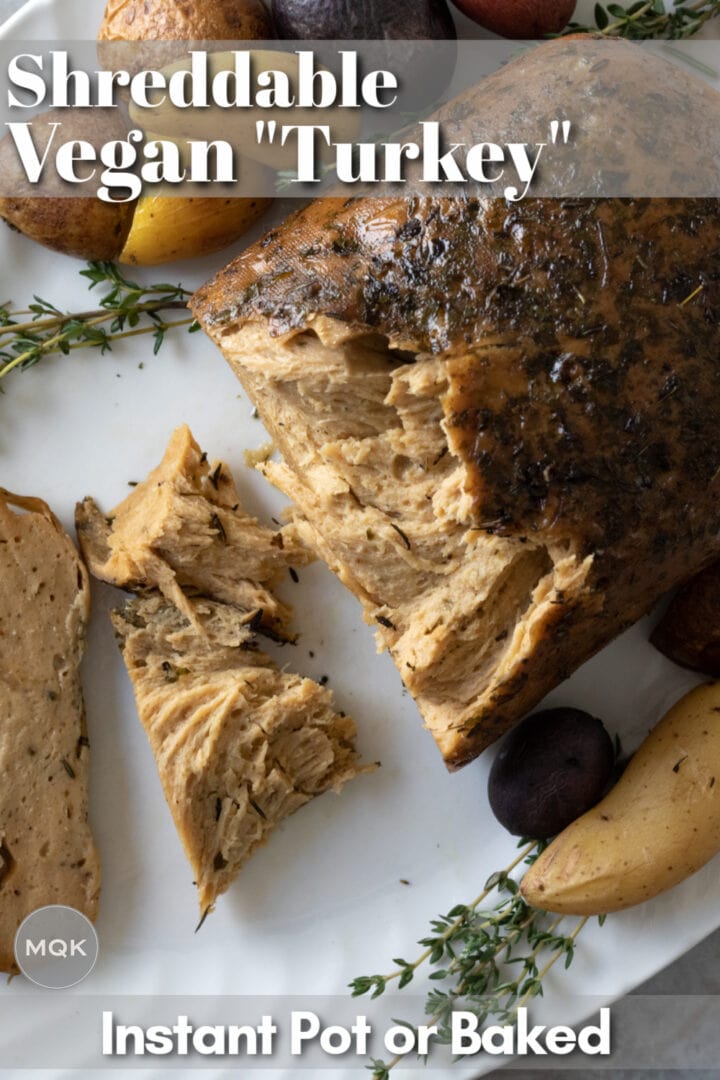
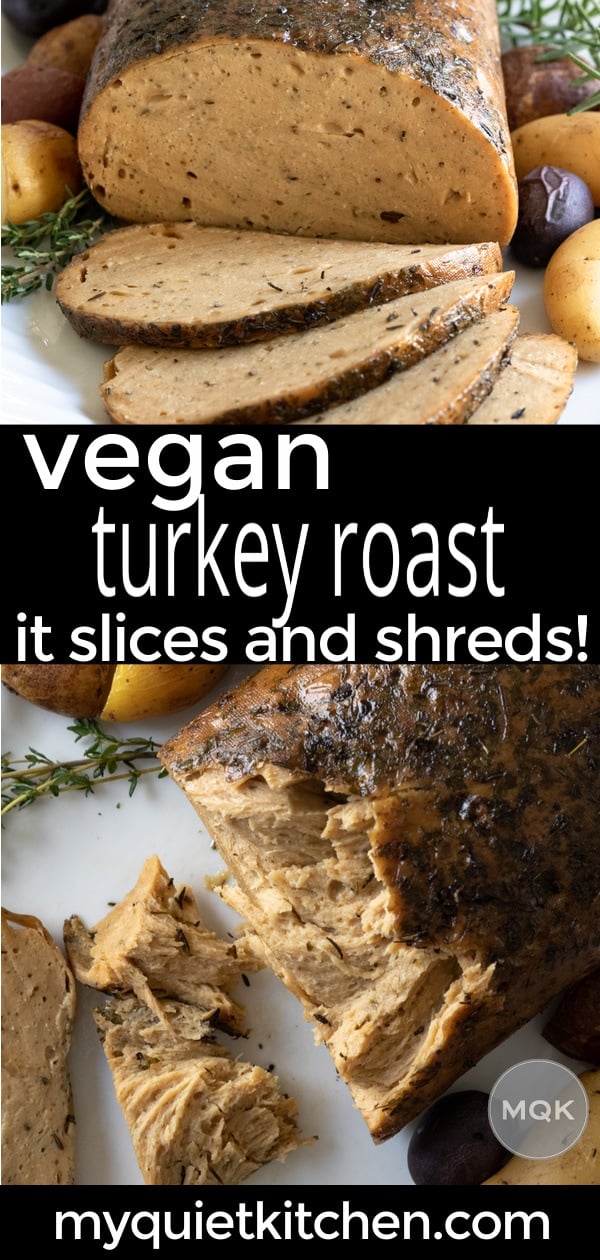
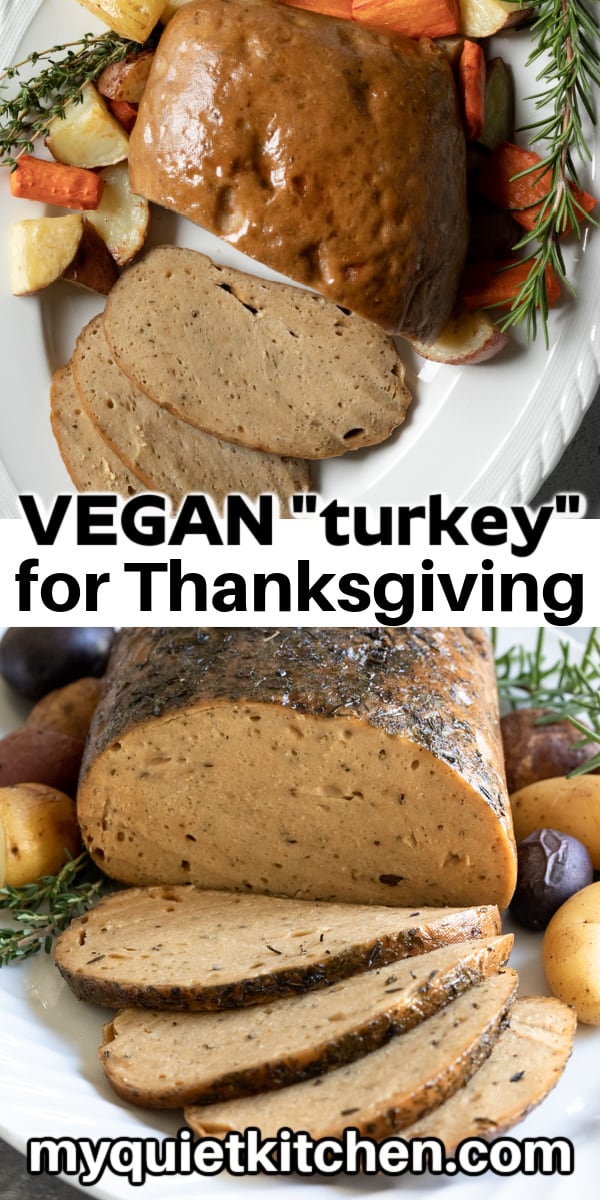
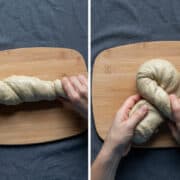
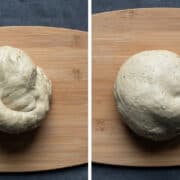
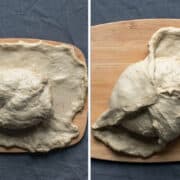
Kevin
I found this to be over-seasoned and too salty. Followed the recipe, but skipped the optional herb rub. If I were to make it again, I'd cut the herbs and salt in half.
David
This is wonderful, and so much better than any frozen Torfurky log. I was really happy with the texture; it is tender but not rubbery or chewy. The "skin" is crispy and delicious. I added a tablespoon of mushroom powder and a teaspoon from a jar of truffle mushroom sauce when making the slurry. It slices beautifully and I have already sliced it super thin for sandwiches. This takes a little advance prep with making it and then refrigerating it but the actual recipe is easy and was fun to shape into a roast.
Tammi Rose
I want to try this for my vegan friends for thanksgiving. We will also be smoking an actual turkey. I could probably wing it, but would anyone have a suggestion for best internal temperature for the vegan turkey?
Lori Rasmussen
Hi Tammi - I love that you want to make this for your vegan friends. That's so kind! I wish I had a simple answer for you, but cooking seitan is more akin to baking than cooking meat. I've actually never taken the internal temperature, since that's more about preventing food born illness (which is very unlikely here). Think of it more like baking a loaf of bread. You judge doneness by appearance, texture, browning, etc. I think finishing the roast on the smoker could add amazing flavor, but I think it's best to stick with one of the 3 tested cooking methods. Another thing to keep in mind, seitan can easily dry out if not wrapped in foil or cooked in steam or liquid. So even in the smoker, I would be careful not heat it unwrapped for too long. I hope that helps!
Mark
Can you use a traditional pressure cooker? I don't have an instant pot but have a regular pressure cooker? I'm guessing it would be the same or less time?
Lori
Good question, Mark. I haven't tried it in a regular pressure cooker but I think it would be comparable. Let us know if you give it a try!
David
I just made the recipe, but out of the food processor, the dough turned out too wet and sticky. I had to add a bit more flour and vital wheat gluten. Have you experienced this in the past? If not, what do you suspect went wrong? Also, when that happens, I'm assuming you'd suggest firming up the dough as I did, right?
Lori
Yes, sounds like you handled it perfectly. Did you weigh the flours? The dough being too sticky simply means there was more moisture than dry. Maybe your tofu had more water than mine or you measured less vital wheat gluten. 👍 Should turn out fine!